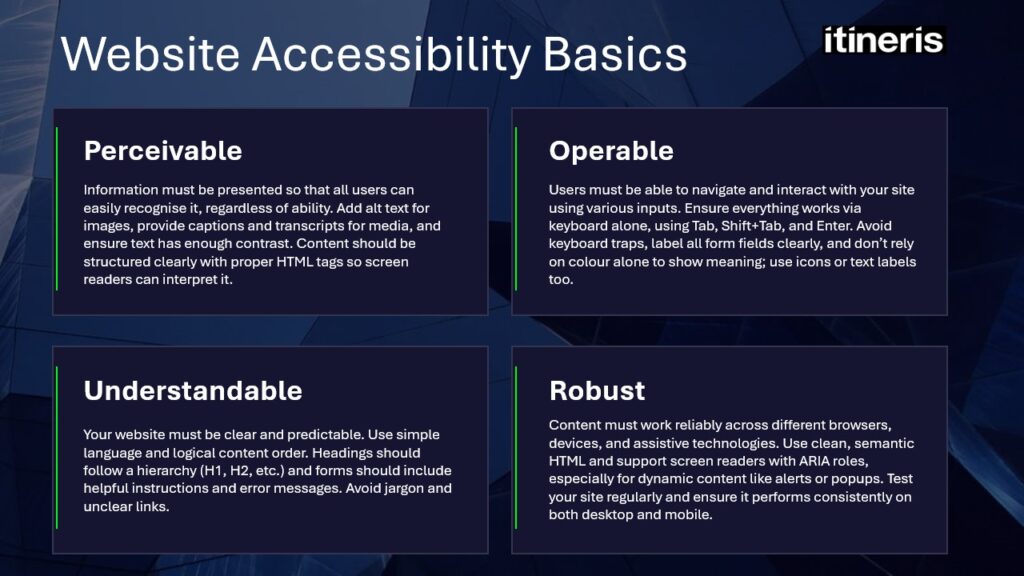Is a Website Audit on Your 2025 Marketing Checklist?
No matter how engaging your website might look or feel, there’s a good chance it has issues hiding under the surface.
This is especially true if you’ve left your website to “rust” for a few years, or if you’ve consistently updated it with new pages, content and plugins without being strategic.
You need a website audit to identify and fix these issues, which you should be doing on a regular basis.
If you’ve asked yourself the question: “do we need to audit our website?”, then the answer is certainly “yes”. Whether your site either has a few technical issues lurking under the surface or not, regular audits are essential for identifying potential problems and keeping things running smoothly. Ignore them, and your site will steadily degrade.
And even if your site doesn’t have any red flags, a thorough audit also identifies opportunities that you might not be tapping into.
The bottom line is that every website needs a regular audit to keep it at the top of its game. Here’s what you need to know about the kinds of audits to do and why they’re so important.

Mark Perry is a Digital Project Manager at Itineris, dedicated to fostering strong client relationships and driving success through innovative digital solutions. With a focus on clear communication and collaboration, he ensures every project aligns with client goals, delivering exceptional results and creating long-term value for all stakeholders.
- Why a Website Audit is Important
- Types of Website Audits
- When Do You Need a Website Audit?
- Why You Need a Website Audit
- Every Successful Website Needs Regular Audits
Why a Website Audit is Important
Quite simply, a website audit helps you understand how well your site is working. It shows you what’s performing, what’s holding you back and where your site needs improvements.
Without one, issues like slow page speed, broken links or poor SEO can go unnoticed.
These issues may start small, but they’ll build up and amplify over time. This can seriously harm your visibility in search results and affect user experience.
A good website audit reveals technical faults, missed optimisation opportunities and underperformance. It gives you a clear picture of your website’s health and helps you make informed decisions that support your wider marketing goals.
After a thorough audit, you’ll have a clear direction on what issues need to be fixed to keep your website running smoothly.
So, regular audits are essential if you want your site to stay fast, findable and effective.
Types of Website Audits
Audit is a broad term, as there are various types of website audits, where each one has a different focus. The three main ones are:
- Technical Audit: A technical audit looks at how your site is built. It checks for problems that stop search engines from crawling your site or slow things down for users.
- SEO Audit: An SEO audit reviews how well your site ranks and why. It analyses keywords, metadata, backlinks and more to find areas where your site can perform better in search.
- Content Audit: A content audit examines the quality and relevance of your written material. It helps you understand what content converts, what needs updating and what can be removed.
Beyond this, you can also run more targeted audits that focus on specific areas like UX, conversion rates, analytics setup or code quality.
Of course, you can combine all of these types into a complete and comprehensive website audit.
Depending on your goals and what you want to check, you don’t always need a full audit. But choosing the right type at the right time can make all the difference.
When Do You Need a Website Audit?
You need a website audit whenever you launch a new site, make major changes or notice a drop in performance.
Beyond these big moments, it’s also important to run one regularly to stay ahead of technical issues, usability problems or missed opportunities in search.
Even if you think you’re doing everything right, regular audits can reveal hidden issues that always tend to spring up. This could be due to technical issues on your site, or from elements outside of your control, like ever-changing search engine algorithms.
For small websites, a full audit once a year is often enough. Larger or high-traffic sites should be reviewed every six months. Although ideally, you’ll run monthly audits to make sure nothing slips under the cracks.
Free audit tools can be helpful for quick checks, but they only scratch the surface. They often miss context, misdiagnose problems or highlight issues without explaining how to fix them.
A proper audit carried out by experts looks at your entire digital setup and provides clear, tailored advice that leads to real improvements.
Why You Need a Website Audit
Think of a website audit like an MOT for your car. It’s a form of preventive maintenance that checks everything’s running smoothly.
So, should you run one on your site? If you’re hesitant, here are some of the main reasons why you absolutely should.
Your Website Might Be Difficult to Use
It’s easy to miss user experience issues when you’re familiar with your own site. But new visitors may struggle to find what they need.
Menus can be too cluttered. Pages may take too many clicks to reach. Key actions like contacting you or searching for content might be buried.
An audit helps uncover these problems by seeing your site through a user’s eyes. If visitors cannot navigate easily, they’ll leave. Search engines notice this too, so a bad UX can have a compounding effect on bounces and traffic loss.
Your SEO Performance May Be Suffering
Even if you publish good content, your site may not be fully optimised for search.
An audit checks whether search engines can access and index your content. It identifies missing metadata, poor use of headings, broken links, duplicate content and much more.
It also assesses mobile responsiveness and load speed, which are two key ranking factors.
Of course, there’s a lot that goes into successful SEO, including complex technical details that go far beyond common on-page insights. The only way to truly get to the bottom of these issues is through a deep site audit.
Without this knowledge, your SEO efforts may never reach their full potential.
You Could Be at Risk of Search Engine Penalties
Older websites or legacy SEO practices can leave you open to penalties. If your site has used tactics like keyword stuffing or poor-quality backlinks, search engines may already be downgrading your rankings.
An audit reveals these risks early. It gives you the chance to remove harmful content or links before they cause long-term damage.
It’s also useful if you’ve already been penalised and need to recover.
Your Website May Be Too Slow
Slow load times harm your user experience and search visibility.
Visitors will not wait. They will leave before your content appears. In fact, in only three seconds, you could lose more than half of your visitors if your website takes too long to load.
Speed is a confirmed major ranking factor for Google. An audit can identify what’s slowing you down, such as oversized images, unnecessary scripts or excessive plugins.
It provides the fixes you need to improve performance and keep users engaged.
Your Competitors Are Probably Doing Better
Any good website audit should include competitor insights.
The idea here is to show how your site compares in terms of search rankings, backlink profiles, content quality and user experience. This helps you spot gaps and opportunities.
If your competitors are attracting more traffic or leads, understanding their strategy helps you build a stronger response.
It’s not just about your website, but staying competitive in your market.
You Need a Baseline for Ongoing Improvement
A website audit gives you a clear picture of where you stand today. It identifies what’s working and what isn’t. You need this to plan improvements based on facts, not guesses.
Running regular audits also helps you measure progress over time. It’s the foundation for any serious digital marketing strategy.
Without it, you’re flying blind and making decisions that aren’t rooted in data.
Your Website May Have Accessibility Issues
Website accessibility is a major topic right now. Not only because of the European Accessibility Act (requiring websites in the EU to be AA-level accessible), but because of the overall benefits.
Many websites unintentionally exclude users with disabilities. This can be an enormous chunk of your potential audience.
If your site is not accessible, it limits your customer base, harms your brand reputation and can even breach legal requirements.

Beyond this, an accessible website provides a better experience for everyone. Accessible sites are faster, cleaner, lighter and easier to navigate. They come with clear SEO benefits, they’re more sustainable and they’ll keep your online presence more competitive.
There’s a lot that goes into accessibility standards, but some of the most common problems include poor colour contrast, missing alt text on images, lack of keyboard navigation and confusing layouts for screen readers. These issues often go unnoticed unless you actively test for them.
Look deeper into your website, and you might come across more technical issues impacting your accessibility level. These are not things that a quick plugin or widget can fix. You need accessibility experts to look into these issues.
A full website audit will highlight any accessibility barriers and give you a clear plan to fix them.
This helps you deliver a better experience for all users and ensures your site meets recognised standards such as WCAG 2.
Security Vulnerabilities
Finally, audits ensure your site remains secure.
Outdated software, unpatched plugins and weak access controls can all leave your website exposed to cyber threats.
A single vulnerability can lead to data loss, malware infections, or damage to your reputation.
Security risks are often invisible until it is too late.
A website audit will check for known vulnerabilities, review how your site handles data and assess overall protection against attacks. It’s a crucial step in keeping your website safe, especially if you collect personal or payment information.
Regular audits help you stay ahead of risks and maintain user trust.
Every Successful Website Needs Regular Audits
One of the first steps in any digital strategy is a thorough website audit. Doing so provides a roadmap. It identifies potential issues to fix, it helps you find opportunities, and it provides a valuable data-driven strategy (helping you eliminate the guesswork).
But a website audit isn’t something you should only do when mapping out an initial strategy or website rebuild. It’s something you should perform on a regular basis to keep your site in check and running smoothly.
That’s why we offer a Protect service to our clients, where we perform regular audits and website checks to ensure everything stays in top working order. After all, your site is always evolving, so you need to ensure it remains in top condition.
Not only does this protect your ongoing performance, but it protects the long-term value of your most important online investment.
Need help keeping your website in order? Get in touch with our team to see how we can help.




